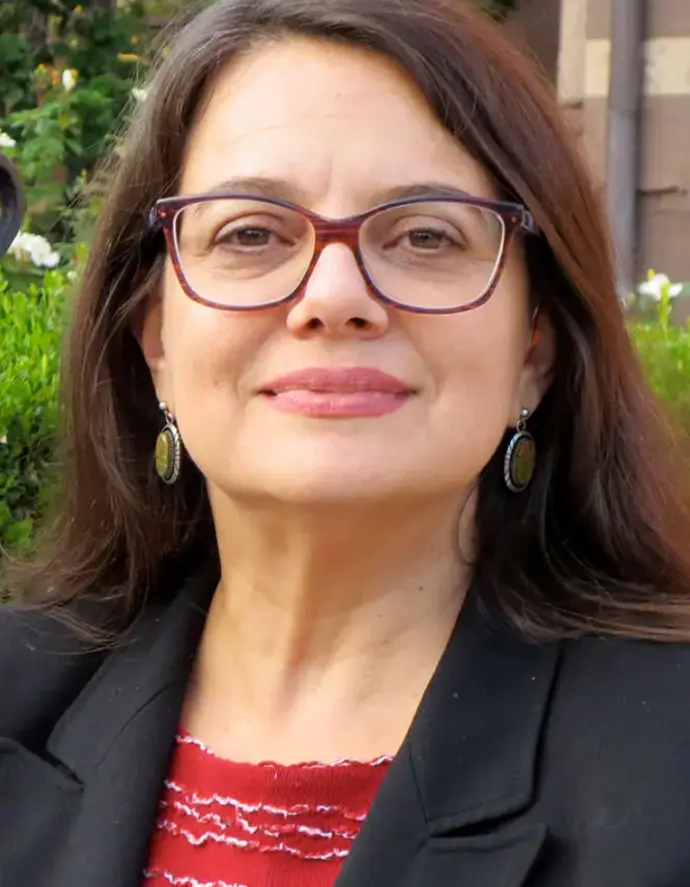ID: A Black woman and child lay in opposite facing positions while the woman gazes at the child.
THENCE writer and editor Helina Seyoum is also the mother of a Deaf child. She describes this meeting and her discussion with Dr. Burke as immensely informative. Ms. Seyoum says that in writing this piece, she has also confronted some of her own experiences with misinformation and bias that can potentially hinder families from fully supporting the development of their hard-of-hearing or Deaf children.
Earlier this year I had the opportunity to sit down with Dr. Teresa Blankmeyer Burke, the first signing Deaf woman to receive her doctorate in philosophy. Dr. Burke also has a background in bioethics and is currently a philosophy and ethics professor teaching in both American Sign Language (ASL) and English at Gallaudet University, the only liberal arts college for Deaf people in the world. Please note that within all articles in this series, “the use of upper case Deaf designates the cultural community of signed language users while lower case deaf designates audiological status" (Burke, 2014).

Dr. Teresa Blankmeyer Burke
"I met a girl who had gone to my same high school who was hard of hearing. We learned that they actively kept us away from each other so we didn’t ‘lean on each other as crutches’. That was the thinking and the language of that time."
ID: A woman looks into the camera and poses for an up close outdoor photo in a black jacket, glasses, and a red blouse.
I began following Dr. Burke's work a couple of years ago after seeing her presentation, A Deaf Child's Flourishing: Choices, Ethics & Identity at a conference focused on providing resources to parents of D/deaf children . I sensed that I had much to learn from her perspective in gaining a better understanding of Deaf culture, signing, and contemporary trends that tell us a lot about how deafness is perceived and even "managed" in society today.
During our conversation, Dr. Burke provided critical insight drawn from both her lived experience as well as her professional expertise. I appreciated learning about her childhood and the challenges she endured growing up as a hard-of-hearing child in mainstream schools. She vulnerably shared this story:
“I would have loved to meet other deaf and hard-of-hearing children. I was isolated. It wasn’t until I got to college that I met a girl who had gone to my same high school who was hard of hearing. We learned that they actively kept us away from each other so we didn’t ‘lean on each other as crutches’. That was the thinking of that time. I recognize I’m using ableist language, but that was literally the language they used. She was two years older than me, but we were in the same big high school of around two thousand students and nobody ever put us together. We met later. Coming up as a hard-of-hearing child who's functioning all right, it would’ve been wonderful to have a friend to share things with. For example, during your first kiss on your porch, when your hearing aid feedback goes off, what do you do? I remember saying, ‘Ooh, that’s just the alarm my dad set up’, and the guy believed it at first. It’s hilarious, but having someone to share those awkward moments with, like wearing a hearing aid or cochlear implant, or not hearing something and figuring out how to respond, makes such a difference. Questioning whether or not to disclose your hearing loss; all of those little things really matter. I'm so glad to see deaf and hard of hearing children in connection with each other. I think it's really important.”
Dr. Burke's experience highlights the importance of deaf peers in helping deaf children develop what has come to be known as a 'horizontal identity', an identity that cannot be cultivated through parentage. Learning about how Dr. Burke was affected reminded me that my daughter, though only four years old now, will have experiences I may not fully understand. It reinforced the importance of helping her build friendships with other deaf children that she may nurture as she grows.
My takeaway from Dr. Burke's anecdote was the importance of supporting the psychosocial development of deaf and hard-of-hearing children by fostering connections with peers who share similar experiences. This is especially valuable for those growing up in hearing families.
Dr. Burke and I went on to discuss why deaf children may not be taught a sign language such as ASL, how this absence of communication can contribute to language deprivation, the increasing medicalization of deafness, and advice for mainstream teachers with deaf students. We also touched on many other key topics surrounding deafness, ASL, and gene therapy.
Dr. Burke offered suggestions and explanations on every issue we covered, with deeper context for circumstances that I have observed or experienced as a mother of a Deaf child that uses cochlear implants.
Please stay tuned for Part II, coming in early 2025, where we explore the relationship between physicians and ASL.
If you have an experience about D/deafness and parenting that you'd like to share, please reach out using the comments, or alternatively for more private conversations, using the form below.
Reference:
Burke, Teresa Blankmeyer. (2014). Welcome!. Teresa Blankmeyer Burke. https://teresablankmeyerburke.net/